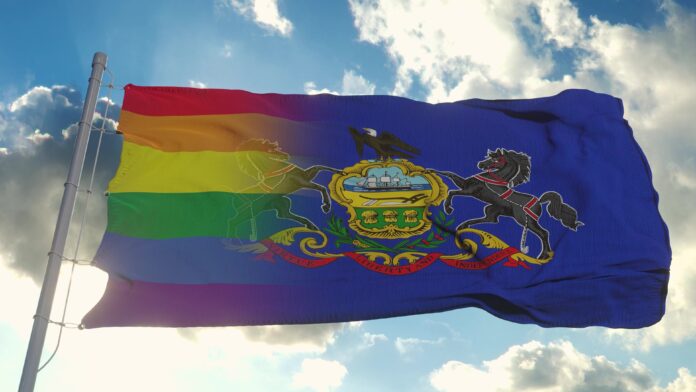The Fairness Act — which seeks to amend Pennsylvania’s Human Relations Act to include sexual orientation and gender identity protections in housing, education, and public accommodations — was introduced in the Pa. House on April 14. The prime sponsors of H.B. 300 are State Reps. Malcolm Kenyatta (D-Philadelphia), Jessica Benham, Dan Frankel, and Latasha D. Mayes (all D-Allegheny), Ismail Smith-Wade-El (D-Lancaster), and Greg Scott (D-Montgomery).
Governor Josh Shapiro has stated passage of the Fairness Act as one of his priorities while in office.
Pennsylvania is the only state in the northeast without statewide nondiscrimination protections for the LGBTQ community. On the local level, around 73 municipalities in the commonwealth have passed nondiscrimination ordinances, but almost 2,500 — which include 65 percent of the population — have no protections for LGBTQ people.
In a joint statement, the bill’s prime sponsors said: “Every single Pennsylvanian deserves to live with dignity and respect. For far too long LGBTQ+ folks across the commonwealth have faced horrific discrimination for who they love, how they identify, and who they are.
“In 2020, in the landmark decision of Bostock v. Clayton County, the United States Supreme Court ruled that an employer cannot discriminate against an individual because of their sexual orientation or gender identity. While this decision was a historic victory for civil rights, it does not prevent someone in our state who identifies as LGBTQ+ from being denied housing, education, or access to public accommodations. These protections must be codified into law.
“Lack of a comprehensive anti-discrimination law in Pennsylvania is a deterrent for workers and businesses who could help grow our economy, and its passage is long overdue. Discrimination in any form degrades us all. We can and must do better.
“That is why we are introducing the Fairness Act (H.B.300) to prohibit discrimination in our state based on sex, sexual orientation, or gender identity or expression.
“We understand and most Pennsylvanians believe that our commonwealth is better when it’s fairer. The introduction of H.B. 300 is the first step in ensuring a fairer and more equal future for all of us.”
In 2010, the last time Democrats controlled the state house, H.B. 300 passed the State Government Committee but then languished in the Appropriations Committee without ever reaching a full House vote. At the time, legislators in opposition to H.B. 300, which included Republicans and Democrats, introduced a combined 48 amendments to “boggle down” the bill, former Rep. Daryl Metcalfe told Valley News Dispatch. Several of those legislators also issued a letter listing statewide and local organizations that stood against the bill, including the Archdiocese of Philadelphia, the Pennsylvania Catholic Conference, and the Pennsylvania State Council of the Knights of Columbus.
The legal landscape for LGBTQ people has shifted greatly since 2010, including Supreme Court’s rulings on Obergefell v. Hodges and Bostock v. Clayton County, Georgia. Many LGBTQ advocates in 2010 felt that existing federal nondiscrimination protections might have bolstered the Fairness Act’s chances of passage at that time.
The religious landscape for LGBTQ people has also shifted, with Pope Francis saying the Catholic Church needs to find a new balance in its relationship with LGBTQ parishoners, as well as concerns of LGBTQ parishoners being acknowledged in the Church’s most recent Synod document.
However, despite the advances the LGBTQ community has made in the last decade, anti-LGBTQ legislation is at an all-time high nationwide. The ACLU is tracking a record number of anti-LGBTQ bills this year, 452, with many focused on healthcare and education. That number is greater than all of 2022.


